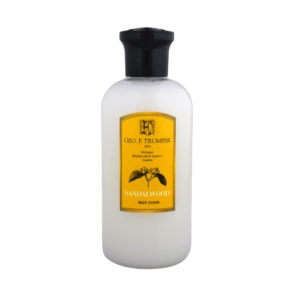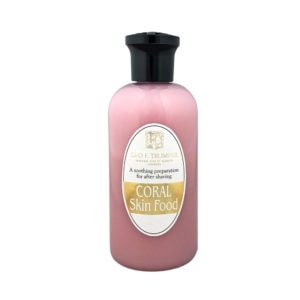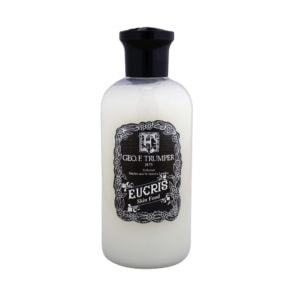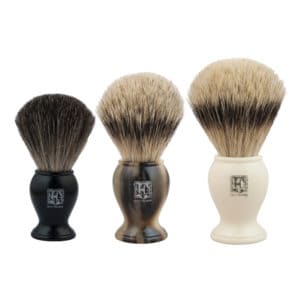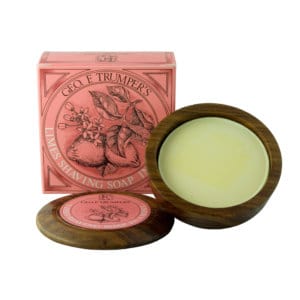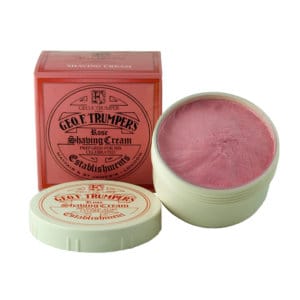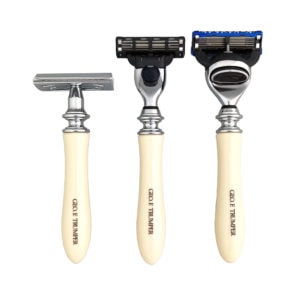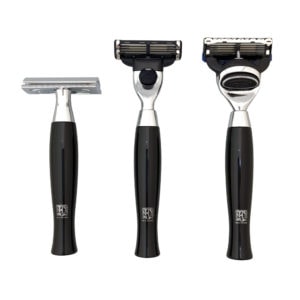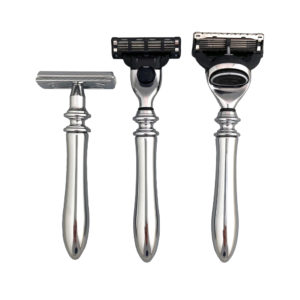Shaving is an art, it is not instinctive knowledge, so it is worth printing this page and keeping it. By refining your technique and using good quality products (which need not be expensive) you can make shaving a pleasurable experience. Remember, how you shave affects the way you look and how you feel about yourself, so keep trying and if you need further advice please email us.
Shaving Technique
1. Hot Water
The first essentials to a perfect shave are water and warmth. When hair absorbs hot water it becomes softer and easier to cut and with warmth the skin and facial muscles become relaxed, making shaving so much easier – thus the best time to shave is after a bath or shower. This effect can also be achieved by soaking a folded flannel or small towel in hot water and wrapping it around the face for thirty seconds or more.
2. Preparing the Face
Those who desire a particularly smooth shave, (or who have sensitive skin) might wish to apply a glycerine-based Skin Food; this protects the skin and helps the razor to glide smoothly across the face. Massaging the skin food against the growth of the beard also helps to lift the beard in readiness for the lather.
3. The Lather
Trumper’s shaving cream may be rubbed into the beard with the fingers, but the best results are obtained when using a good quality badger shaving brush. When using cream, place a modest amount in the palm of one hand, dip the brush into hot water and using a circular motion in the palm, build up a rich creamy lather on the brush. Wet the face, and again with a circular motion apply the lather to the beard, allowing the brush to lift the beard, making the hairs stand proud. The brush may be dipped lightly into hot water if more moisture is required in the lather. If using shaving soap, dip the brush in hot water and use a similar circular motion on the soap to create a rich lather.
4. The Shave
Using a good quality razor blade that has been warmed in the sink or under hot running water, shave the face in the direction of the beard growth, rinsing the blade in hot water frequently. Never shave ‘against the grain’ of the beard, in awkward areas such as the chin and under the nose the blade can be moved sideways across the growth – but never against as this pulls the skin in the wrong direction causing small cuts and ‘grazing’ to the skin and is the most common cause of ‘razor burn’, in-grown hairs and shaving rash. Rinse the face thoroughly with cool water and pat dry with a soft towel.
5. Caring for the Skin
A good wet shave exfoliates and cleanses the skin, leaving smooth new skin and a healthy clean appearance. Newly exfoliated skin needs to be protected from the elements, so for healthy skin it is important that men use an after-shaving Moisturiser or Skin Food. Products containing alcohol should not be applied to the skin directly after shaving as this may inflame the skin and cause dryness. For best results cologne and other fragrances should be applied to the ‘hot spots’ behind the earlobes and on the sides of the neck.
General shaving tips
- Shower or bathe before shaving, or warm the face with a hot flannel.
- Use plenty of hot water and shave in a warm environment.
- Protect the skin with skin food or moisturiser.
- Use a quality badger brush with good shaving cream or soap.
- Brush in a circular motion to lift the beard.
- Shave with the beard, never against the grain.
- Rinse the blade frequently in hot water.
- Rinse face well with cool water and gently pat dry.
- After shaving use a moisturiser or skin food.
- Avoid applying alcohol-based products to the face after shaving.
Taking care of your brush and razor
After shaving, rinse your brush and razor thoroughly to remove soap and flick to remove most of the water. Brushes are best hung on a brush stand so that water can move away from the base of the hairs. To avoid mildew, do not keep damp brushes in a closed cupboard or washbag for any length of time. If your brush becomes clogged with soap, soak in a mild solution of borax until clean.


